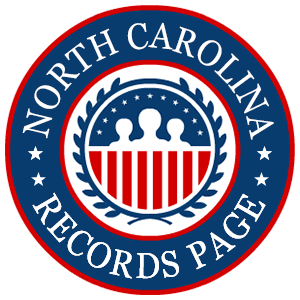Access free North Carolina public records today via the online search tools and steps outlined in this brief resource.
Various state records — like marital, divorce, birth, death, criminal, arrest, property, and court proceedings — became publicly available when the North Carolina Records Law was enacted in 1935.1 Citizens are given the right to request these records for free in accordance to guidelines set by the North Carolina government.2 Due to the vast nature of the public records repository, finding specific information comes down to knowing how to look up desired records.
This streamlined article helps users navigate through the myriad of databases and offices to provide clear tips and linked online tools for tracking down all types of North Carolina state records.
North Carolina Public Information Laws
The United States has given the right of record access to citizens through the federal Freedom of Information Act. This law was enacted in 1967 but only applies to federal agencies.1 Each state has a specific set of laws or statutes that govern information, including North Carolina.
According to the North Carolina General Statutes 132-6-6.2, records should be provided promptly, with some exceptions, to any individual with no proof of purpose.3 Because of the North Carolina Public Records Law and its commitment to transparency, many avenues have become available to locate public information in North Carolina.
At the forefront of these resources are government-owned sites and when conducting a search on these platforms, the inquiring party must know specifics.
If inmate records are in question, the city or county where the inmate is housed is imperative. For access to court records or criminal records, the corresponding authority and court must be found. Vital records, including birth certificates, death certificates, and marriage licenses, can typically be ordered from the state but can take in excess of 6 months to receive.4
Ordering vital records from the county is generally a speedier process, but if the information on that location is inaccurate or unknown, results could be skewed.
Another channel to obtain state records is using a private or third-party company. These companies remove the need for excessive searching, give heightened privacy, and produce faster results.
Although the public does have a right to North Carolina state records, it is admissible for government and private entities to charge a fee to provide these services. The possibility of finding the information needed for free is possible and advice on where to search is listed below.
For added or expedited results, third-party sites can be utilized and can provide a quick, comprehensive list of results for a relatively small charge.
An Overview of Criminal Records in North Carolina
Criminal records in North Carolina consist of information regarding misdemeanors, felonies, and violations, all handled by the respective court system.5
Exceptions are put in place on access to certain types of documents and information, but available public criminal records can be helpful when looking into the background of potential employees, partners, tenants, etc. Also included with criminal records are infractions. Infractions are violations of the law that are not criminal offenses but may be of interest to an inquiring party.
Who Can View Criminal Records in North Carolina?
Viewing criminal records in North Carolina has little restriction due to the North Carolina General Statutes and by little restrictions, it allows anyone to look up someone’s criminal record.
There are, however, certain records these searches would not produce, and those include expunged, sealed and juvenile court records. Expunged and sealed court records are not visible to any entity unless expressly authorized by a judge.
How To Search Thr0ugh Someone’s Criminal History Details in NC
Criminal records in North Carolina are prepared and held by various entities, such as local and state law enforcement, the court systems, and jails/prisons. These records include:6
- Name
- Birth date, gender, race, etc.
- Fingerprints
- Mugshot
- Misdemeanor criminal convictions
- Felony criminal convictions
- Arrest, warrant, and infraction history
Individuals seeking criminal records in North Carolina have multiple avenues.
A certified criminal record search, self-service non-certified background check, North Carolina State Bureau of Investigation Statewide Background check (limited to one’s self), an informal inquiry of court records, offender registries, and third-party vendor background checks are all ways of obtaining the different types of information in question.
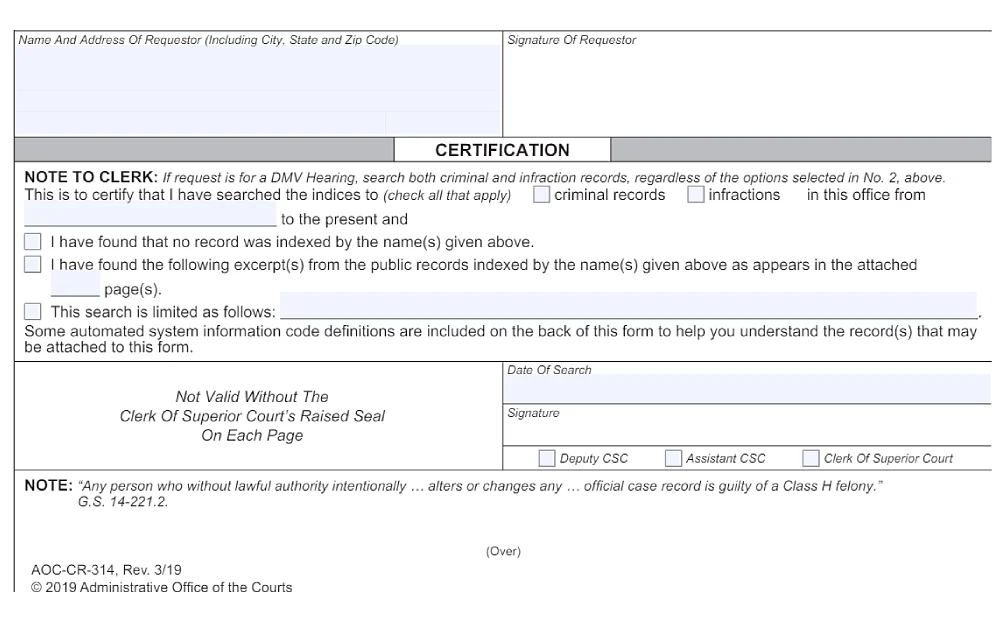
If a certified criminal record search for one’s self or others is needed, an individual can check public records by submitting a request to the clerk of superior court office in the corresponding county. This includes the option of searching criminal records and/or infraction records.
As mentioned in the Criminal Record Search form, an infraction in the state of North Carolina is not a criminal violation of the law. If found responsible for an infraction, it does not assume criminal activity. When performing a search, the complete record of a defendant requires a search for each. There are multiple categories that include both types of offenses, such as motor vehicle offenses.
If criminal records are only needed, the infractions check mark can be ignored. Infraction records stored electronically are no longer available five years after disposition.7 Please note: this search is NOT statewide and will only return results if the county the criminal records are held in is contacted.
A fee is associated with this certified request and will cost $25. Form AOC-CR-314 can be mailed to the court with a money order or certified check or submitted in person with cash, credit card, money order, or certified check. In-person hours, along with location and phone numbers, vary by the county courthouse.
A non-certified possibility for searching, viewing, emailing, and printing North Carolina state records is also available.
Self-service public access computers are available in the county clerk’s office at each courthouse. Although access to the computers is free, a fee may be charged for printing.
Businesses conducting record searches are given several methods as well, including the North Carolina Administrative Office of the Courts’ Remote Public Access program, the North Carolina State Bureau of Investigation Statewide Background check (for employees), and third-party vendor background checks.
More detailed information on background checks can be found below.
How To View North Carolina Mugshots
As mentioned previously, mugshots are included in certified criminal record searches.
The North Carolina Department of Public Safety, the North Carolina Sex Offender and Public Protection Registry, county sheriff’s office websites, and city police websites often have mugshot photos available. Other ways to access and view mugshots are third-party sites, which could charge a fee.
A Google search can lead to specific city and county entities that might provide these mugshots.
A query for an active inmate not only provides a mugshot but a full webpage full of details regarding personal and arrest information.
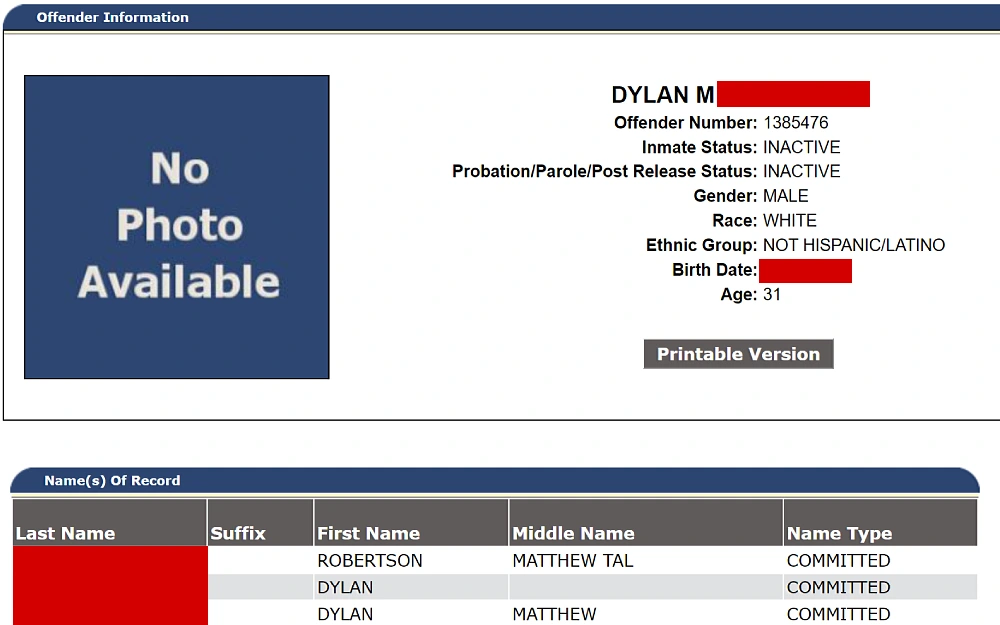
A party can perform a google search with the terms “North Carolina Sex Offender Mugshots”, which will lead them to the North Carolina Sex Offender & Public Protection Registry. Once an offender search is performed, a list of corresponding parties will appear with an accompanying mugshot.
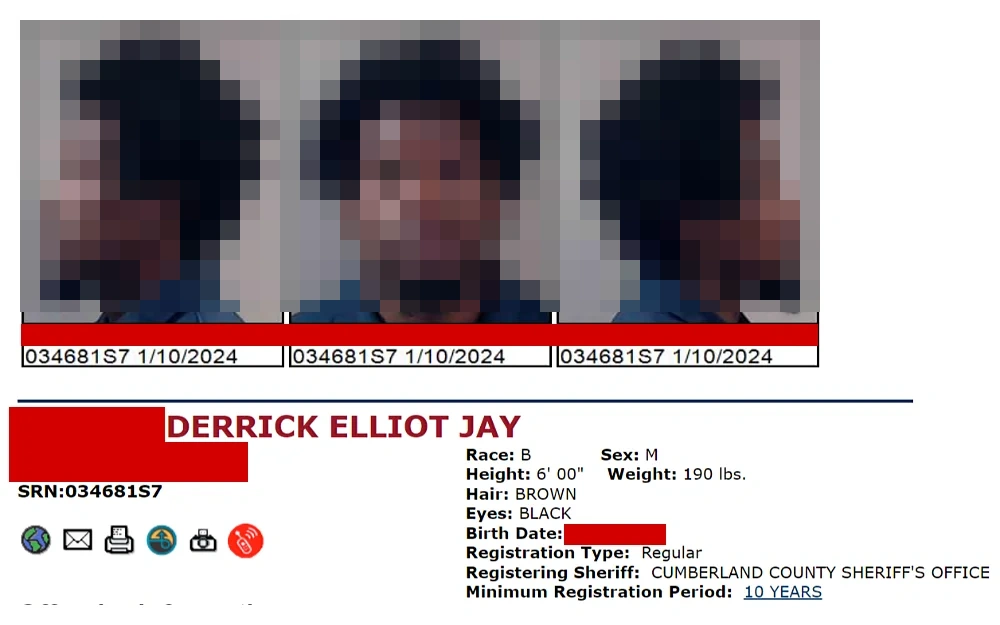
For a more granular search, Google can lead to city and country-specific resources.
A Google search of “Wake County North Carolina mugshots” leads to the Raleigh/Wake City-County Bureau of Identification (CCBI) inmate roster which is a repository for mugshots and arrests in the area.
A more comprehensive explanation of how to find local arrest records and inmate information can be viewed in the tutorial for locating public information in Wake County at no cost, along with many other public records throughout the county–including criminal proceedings, court case documents, probation information, property records, and more.
Furthermore, the resource on North Carolina criminal and arrest records contains jail rosters and contact information for all NC criminal and arrest record custodians and many more criminal record custodians that can be searched.
In addition, VINELink may also show mugshots of arrestees, but it depends on the facility.
Who Can Look Up NC Juvenile Public Records?
Juvenile court records are an exception to the North Carolina Public Records Law. According to the North Carolina General Statute 7B-3000,8, juvenile records will not be released to the general public and are only allowed access, unless sealed by the court, by the following:
- The juvenile or the juvenile’s attorney
- The juvenile’s parent, guardian, or custodian, or the authorized representative of the juvenile’s parent, guardian, or custodian
- The prosecutor
- Court counselors
- Probation officers in the Section of Community Corrections of the Division of Adult Correction & Juvenile Justice of the Department of Public Safety
See if You’re Wanted in NC (Free Warrant Search)
North Carolina defines a warrant for arrest as consisting of the crime of the person accused, a direction to arrest the accused person, and the authorization to hold the person to answer to the crimes in which they were accused.9
Unlike some states, North Carolina does not have an overarching search tool for looking up a warrant. However, individuals have several options to find out if they’ve been charged with a crime and whether there is a warrant out for their arrest.
Through the Right To Review Process,10 the North Carolina State Bureau of Investigation is bound by the law to supply individuals with their criminal history records, which includes outstanding warrants. The current processing time is 2 calendar weeks.
To conduct this request, a written submission to the NC State Bureau of Investigation should be sent to the following:
Civilian Services Unit: Right to Review
PO Box 29500
Raleigh, North Carolina 27626
Include a $14 certified check or money order made payable to the NC State Bureau of Investigation.
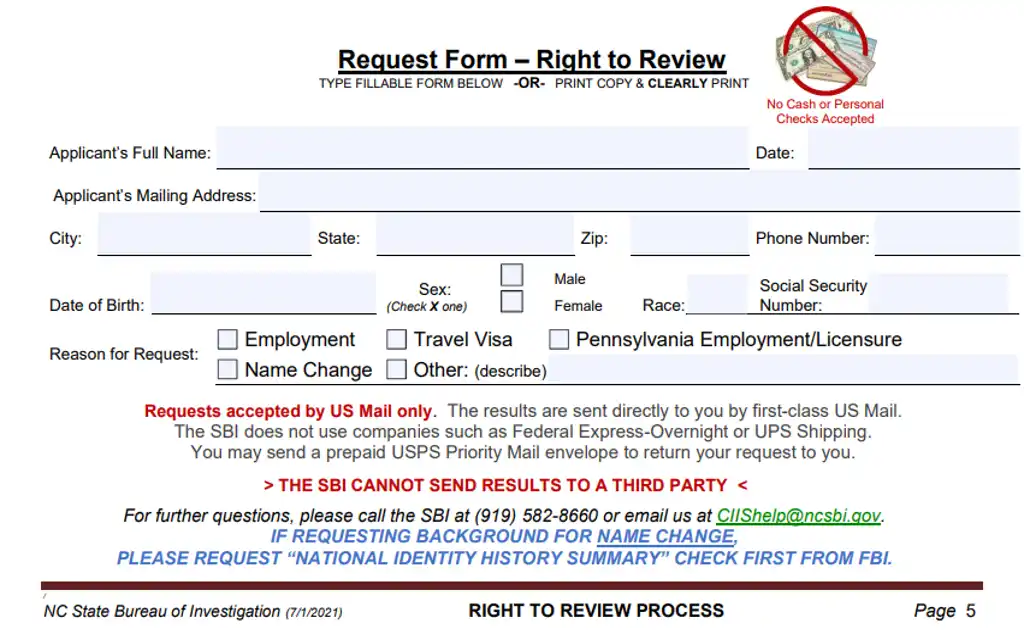
A two-week timeframe may not be a feasible amount of time to wait, so alternatively, county clerk’s offices and sheriffs throughout the state can help citizens locate warrants in the corresponding county. The addresses, contact information, and hours of operation for each office vary per location.
Another option for looking up warrants is to conduct searches on the county level, primarily through local law enforcement agencies. For example, individuals can check out this resource on how to look up free public records in Mecklenburg County, which includes the most efficient ways to find warrants, inmates, criminal history reports, background checks, vital records, probationer details, and more can be found here.
Lastly, third-party websites are available to aid in the search for outstanding warrants. It is important to note that these companies are not government-owned, so the provided information may differ. However, the service provided (typically for a small fee) offers a simple and expedited starting point for a search.
Access the NC Sex Offender Registry
Access to the North Carolina Sex Offender & Public Protection Registry is straightforward and simple to navigate.
The North Carolina State Bureau of Investigation (SBI) manages the registry and gives multiple ways to search offenders at no cost. The options to “Find Offenders Near You By Address” and “Offender Search” are at the forefront of the form as seen below. The ability to search offenders by sex registration number and latitude/longitude is also available.
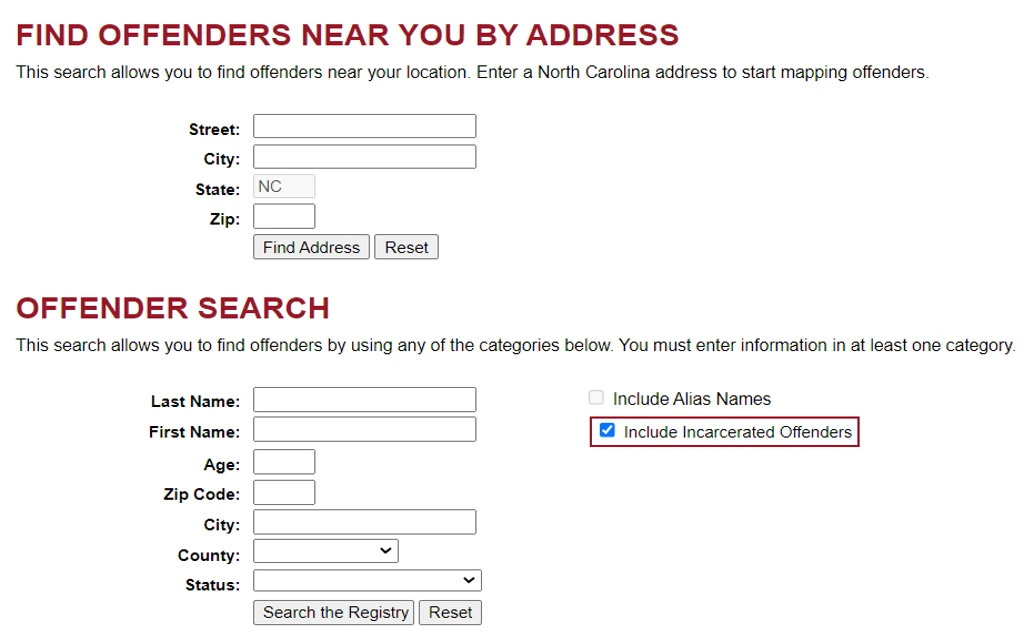
Other features provided by the SBI are statistics, email alerts, telephone alerts, and mobile applications.
Per county, statistics are available for download. The data provided through the download is extensive, but please be aware that accuracy could be affected by processing errors or delays.11 According to the statistics given by the North Carolina Sex Offender & Public Protection Agency, there are 26,141 sexual offenders living in the state of North Carolina.
Email alerts can be set up online by creating a free account. Text alerts can be set up by phone at 877-627-2826 or online at Statewide Automated Victim Assistance & Notification.
The mobile application (icon shown below) is available on both Apple and Android platforms. The app allows comparable searches to those online and gives a detailed map with the locations of offenders.
Running Background Checks in North Carolina
State-endorsed background checks consist of two different varieties: criminal and employment.
Criminal background checks include misdemeanor criminal convictions, felony criminal convictions, arrest, warrant, and infraction history. Employment background checks verify the name, employment history, birth records, education, residency, and if someone has a criminal record.
As detailed previously, to receive a prison background check including criminal records as an individual, the information can be requested from the corresponding county clerk or through a self-service computer at any courthouse. Third-Party vendors are also available for expedited results.
In North Carolina, the North Carolina Administrative Office of the Courts’ offers the Remote Public Access program (RPA). As the name suggests, this program offers remote access to data held by North Carolina criminal and civil courts. This service is costly and has stringent requirements, making it more appropriate for businesses and employers as opposed to the public.
The North Carolina State Bureau of Investigation (SBI) processes background checks for employees where the employer has specific statutory authority.12
Third-party background checks for employers will likely garner the most complete and concise information needed.
NC Court Records
The court systems in North Carolina are as follows:13
- District Courts – hears cases regarding civil, criminal, juvenile, and magistrate affairs
- Superior Courts – handles civil and criminal cases over $25,000, as well as probate
- Court of Appeals – tasked with retrying cases
- Supreme Court – the highest tier in which a case can be appealed in the state
The district courts and superior courts are located throughout the state. The Court of Appeals and the North Carolina Supreme Court are both located in the state capital of Raleigh.
As reviewed previously, unless sealed, most court records, like criminal records, are available to any citizen requesting them.
Where To Find North Carolina Court Records
District and Superior Court records, which include civil and criminal matters, can be found by visiting the respective court.
The courthouse clerk’s office can provide individuals with resources to search the North Carolina state records in question and obtain a paper copy of the file for a fee.
The particular court could have records available online, but it is not guaranteed. To find courthouse information and locations, an interactive map of counties is located on the Locations page of the North Carolina Judicial Branch website.
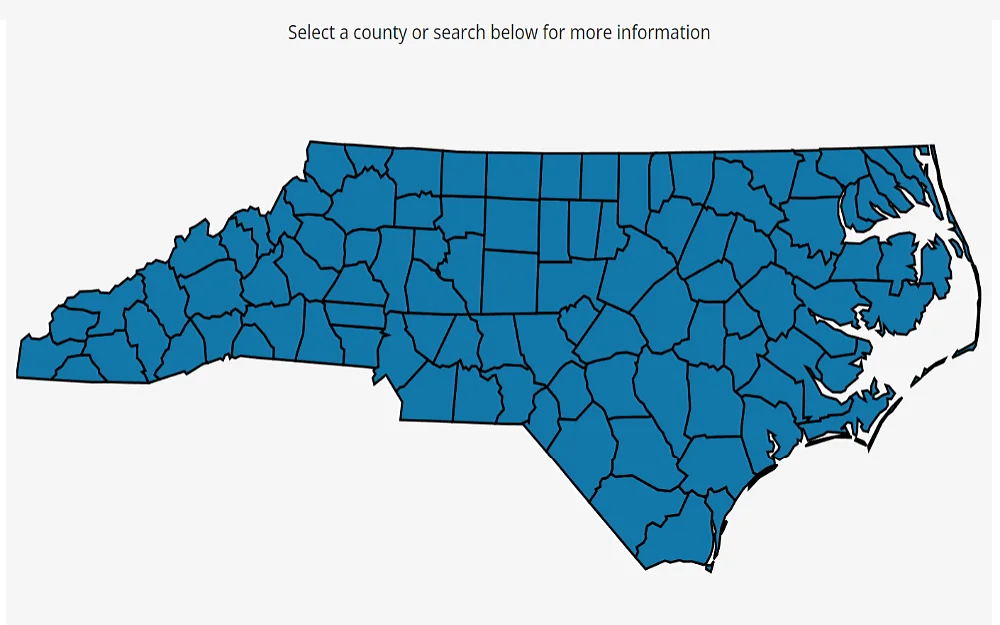
The North Carolina Court of Appeals and the North Carolina Supreme Court both house electronic document records on the NC Supreme Court & Court of Appeals’ Electronic Filing Site & Document Library.
If the information can not be found online, visiting the courthouse may be the next best option.
The private and third-party websites also have the ability to search court records for civil, family, criminal, traffic, warrants, jail, and arrest matters.
How To Track Down Bankruptcy Information in NC
Bankruptcies in North Carolina are processed through the United States Bankruptcy Court and split into two divisions: the Western District of North Carolina and the Eastern District of North Carolina.
Because these are federal courts, case information can be made through the Public Access to Court Electronic Documents (PACER) website.
Bankruptcy records for cases filed on or after December 1, 2003, may be accessed by doing the following:
- Go to PACER and register for a login and password.
- Next, return to the court’s website and click on CM/ECF Filing.
- Navigate to Eastern District of North Carolina – Document Filing System or Western District of North Carolina – Document Filing System and login.
- Search for a case by going to Query. The search fields include name, case number, or social security number.
- Fill in the applicable field(s) and click Run Query.
- If more than one case is returned by the query, select the correct one.
- To print documents, click on the Docket Report link, click Run Report and select the desired documents. Case documents are $0.10 per page but are capped at $3.00 for a single document.
Requests for documents before December 1, 2003, can be made by mail to the following addresses:
United States Bankruptcy Court
Western District of North Carolina
401 West Trade Street, Suite 2500
Charlotte, NC 28202
Or:
United States Bankruptcy Court
Eastern District of North Carolina
P.O. Box 791
Raleigh, NC 27602
There is a $30.00 record search fee plus a $.50 per page copy charge, which can be submitted with the request by certified check or money order.
There are several court locations throughout the state in the cities of Raleigh, Greenville, New Bern, Wilmington, Fayetteville, Charlotte, Asheville, Statesville, and Shelby. Before visiting a particular court, information can be found online as to what is serviced at each location.
For closed bankruptcy cases, please visit the National Archives Court Records page.
A Look at North Carolina Inmate Records
Several reasons exist for searching NC inmate records, such as searching for a loved one, specifics to send money to inmates, planning to visit an inmate or finding out the sentencing and whereabouts of a particular person.
A significant percentage of inmate records are public information and hold the following details, at a minimum:
- Personal Specifics (Name, age, birth date, sex, race, etc.)
- Offender Number
- Incarceration Status & Term
- Conviction & Projected Inmate Release Date
- Crime
- Admission Date
- Location Specifics
- Escape Attempts
- Parole Details
Of all the inmates to find, juveniles are the most difficult, if not impossible. Individuals under the age of eighteen are considered minors, and their records are typically sealed. A simple online search will, for the most part, pull up nothing.
If it is crucial to find the location of a juvenile inmate, the whereabouts of the minor must be known and proof of affiliation or relation must be provided once the facility is reached directly.
How To Check if Someone Is in a North Carolina Jail
Locating an inmate in a North Carolina Jail may not be straightforward and can pose difficulties due to the detail needed. Jails are typically for short-term stays and are run by the city or county government.
Finding out if someone was arrested or is in jail may take trial and error due to the number of cities and counties and their proximity.
The county sheriff’s office may have inmate records online, which could be a starting point. For example, anyone can look up arrest, police, and jail records in Wake County using various methods. Similarly, citizens can seamlessly view offenses and arrests in Davidson County.
A search engine query would be an ideal way to locate whether the information is housed online. A combination of search terms, which include “recent arrests” plus the specific county or city, should yield fast results.
Check Who Is Being Held in a North Carolina Prison
Finding an inmate in a state prison in the state of North Carolina is less complicated.
The North Carolina Department of Public Safety has a dedicated page on which prisoner inmate information can be queried. The Offender Public Information page allows searches by name, offender number, gender, race, ethnic group, birth date, or age range.
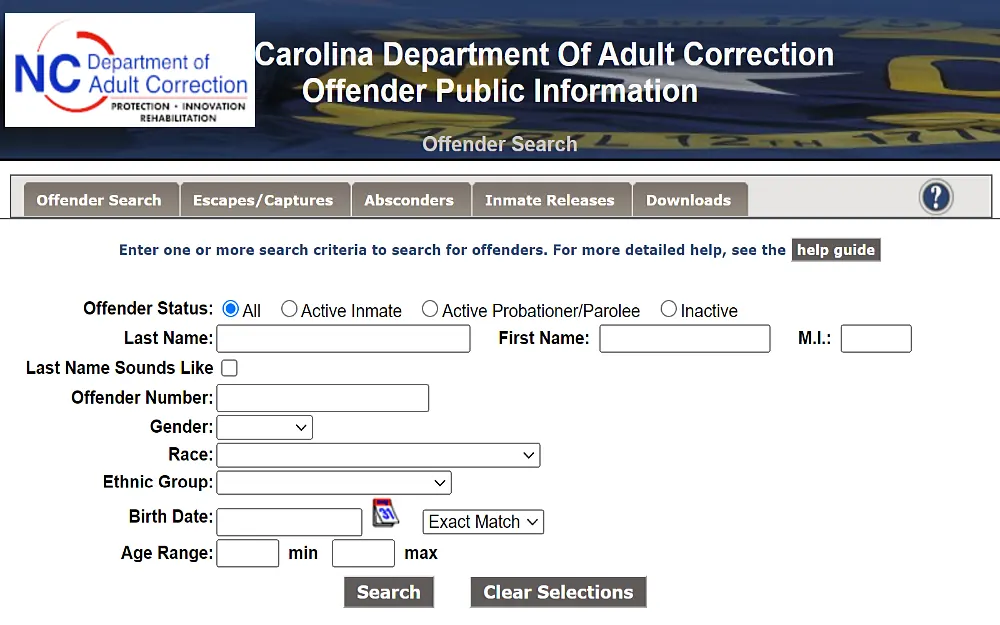
Federal prison inmate searches in North Carolina are straightforward as well. Because all federal prisons in the United States are managed by the Federal Bureau of Prisons, all inquiries for federal inmate information can be conducted through this site. The Find an Inmate page allows searches by the following information:
- Bureau of Prisons Record Number
- DCDC (D.C. Department of Corrections) Number
- FBI Number
- INS Number
- First & Last name
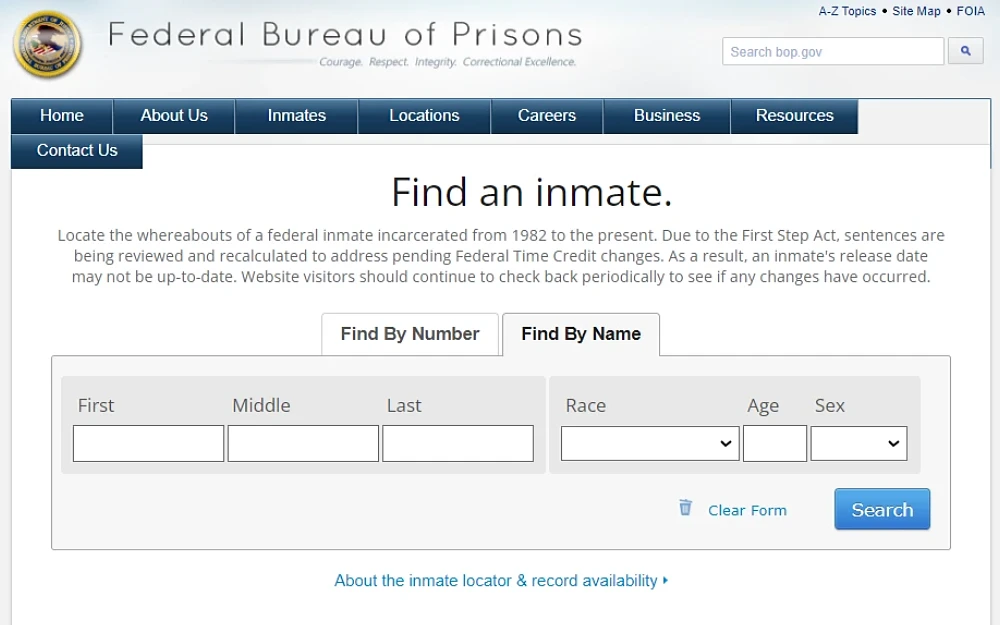
NC Vital Record Certificates
Vital records in North Carolina include the registration of all births, deaths, fetal deaths, marriages, and divorces that occur in the state.
Vital records are for more than just information; they are imperative for many processes, such as:
- Obtaining government documents
- Insurance purposes
- Financial situations
Accessibility of Vital Records in North Carolina
The general public has access to all uncertified versions of vital records in North Carolina. To request a certified copy of a certificate, the requestor must be an approved relation.
Uncertified versions of documents can often be found on the Registrar of Deeds website for a particular county.
Using the search term “Mecklenburg County vital records” will produce the Mecklenburg Office of Vital Records website. The Mecklenburg County Register of Deeds Web Access will then allow an electronic records search.
In either case, the graph below shows North Carolina’s divorce rates by county and based on the United States Census Bureau estimates over the past 5 years.
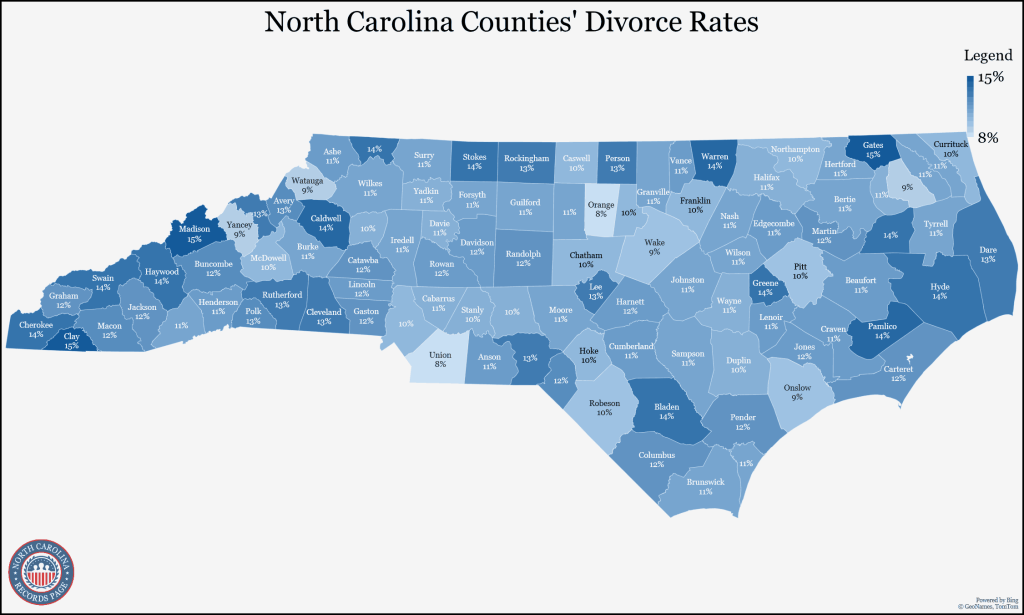
See if Someone Is Married or Divorced in NC (Free Marriage & Dissolution Records)
To find out if someone is married, the names of applicants are needed along with the date of marriage, and the place where the marriage license was issued.
To search for a North Carolina divorce certificate, the names of spouses are needed along with the date of divorce, and the city or county where the divorce was filed for. If a certificate is needed, it can be obtained through the VitalChek website or by calling VitalChek toll-free at +1-800-669-8310.
VitalChek requires certain information to process the document request and, upon payment, will supply a certified copy of the requested document. The current processing time for VitalChek is 3-4 months. Marriage certificates can also be requested in person at the Register of the Deeds in the county where the marriage occurred and typically has an immediate turnaround.
To obtain a certificate directly from NC Vital Records, individuals can make an appointment with NC Vital Records Appointments for in-person, expedited help (an additional $15) or by mail using the following:
- Complete, print, and sign the proper form.
- Include a $24 money order, certified check, or business check (not a personal check) for the first copy of the certificate and $15 for each added certificate.
- Make payment to “NC Vital Records”.
- Do NOT send cash.
- Do NOT send an expedited fee.
- Do NOT send overpayment, as it may result in processing delays.
- If no record is found, a letter will be sent documenting such. Note: The $24 search fee is non-refundable even if a record is not found.
- The current processing time is between 6 months to 1 year.
Mail the completed, signed form and payment to:
North Carolina Vital Records
ATTN: VC Certificate Orders
1903 Mail Service Center
Raleigh, NC 27699-1900
A list of fees for search and document production is contained in the below graphic.
Get Copies of Death & Birth Certificates in NC
To get copies of death or birth certificates in North Carolina, the same processes for other vital records apply, such as marriage certificates. The VitalChek website gives online access to parties related to the subject of the requested certificate.
Additionally, requests for North Carolina state records, which include death and birth certificates, can be made in person as well at the corresponding Registrar of Deeds or NC Vital Records office or by mail.
References
1Freedom of Information Act: Learn. (n.d.). FOIA.gov. Retrieved June 27, 2022, from <https://www.foia.gov/about.html>
2Comprehensive Information About How to Find North Carolina Public Records. (2022). Retrieved June 9, 2022, from <https://www.publicrecordcenter.com/about_north_carolina_records.html>
3Chapter 132. (n.d.). North Carolina General Assembly. Retrieved June 27, 2022, from <https://www.ncleg.net/enactedlegislation/statutes/html/bychapter/chapter_132.html>
4NCDHHS: DPH: NC Vital Records: General Issuance Certificates Processing Dates. (n.d.). NC Vital Records. Retrieved June 27, 2022, from <https://vitalrecords.nc.gov/processing-dates.htm>
5North Carolina Public Records Search. (n.d.). SearchSystems.net. Retrieved June 27, 2022, from <https://publicrecords.searchsystems.net/United_States_Free_Public_Records_by_State/North_Carolina_Public_Records/>
6Criminal Background Check For Employment. (n.d.). GoodHire. Retrieved June 27, 2022, from <https://www.goodhire.com/screening/criminal-background-check/>
7North Carolina Judicial Branch. (2019, March). State of North Carolina Criminal Record Search. State of North Carolina. Retrieved June 9, 2022, from <https://www.nccourts.gov/assets/documents/forms/cr314.pdf?2SCRYXFbAJ6Ydvtm60rzYQTnymJSfy9n>
8North Carolina Legislature. (n.d.). North Carolina General Statutes. North Carolina General Assembly. Retrieved June 9, 2022, from <https://www.ncleg.net/EnactedLegislation/Statutes/PDF/ByArticle/Chapter_7B/Article_30.pdf>
9North Carolina Legislature. (n.d.). North Carolina General Statutes. North Carolina General Assembly. Retrieved June 9, 2022, from <https://www.ncleg.gov/EnactedLegislation/Statutes/HTML/BySection/Chapter_15a/GS_15a-304.html>
10North Carolina State Bureau of Investigation. (2021, July 1). Right to Review Process. North Carolina State Bureau of Investigation. Retrieved June 9, 2022, from <https://www.ncsbi.gov/Services/SBI-Forms/SBIRight-to-Review__FILLABLE-2021.aspx>
11North Carolina State Bureau of Investigation. (n.d.). Offender Statistics. North Carolina Sex Offender and Public Protection Registry. Retrieved June 9, 2022, from <https://sexoffender.ncsbi.gov/stats.aspx>
12North Carolina State Bureau of Investigation. (n.d.). NCSBI – Employers/Licensing Entities. North Carolina State Bureau of Investigation. Retrieved June 9, 2022, from <https://ncsbi.gov/Services/Background-Checks/Employers-Licensing-Entities>
13Courts | North Carolina Judicial Branch. (n.d.). The North Carolina Judicial Branch. Retrieved June 27, 2022, from <https://www.nccourts.gov/courts>
14STATE OF NORTH CAROLINA. Accessed 6 May 2023. <https://www.nccourts.gov/assets/documents/forms/cr314.pdf?2SCRYXFbAJ6Ydvtm60rzYQTnymJSfy9n>
15North Carolina Department Of Adult Correction Offender Public Information. Accessed 6 May 2023. <https://webapps.doc.state.nc.us/opi/viewoffender.do?method=view&offenderID=1385476&searchLastName=Robertson&searchDOBRange=0&activeFilter=2&listurl=pagelistoffendersearchresults&listpage=1>
16The North Carolina Sex Offender and Public Protection Registry. Accessed 6 May 2023. <https://sexoffender.ncsbi.gov/details.aspx?SRN=034681S7>
17North Carolina State Bureau of Investigation, 1 July 2021. Accessed 6 May 2023. <https://www.ncsbi.gov/Services/SBI-Forms/SBIRight-to-Review__FILLABLE-2021.aspx>
18North Carolina Offender Registry. Accessed 6 May 2023. <https://sexoffender.ncsbi.gov/search.aspx>
19The North Carolina Judicial Branch. Accessed 6 May 2023. <https://www.nccourts.gov/locations>
20North Carolina Department Of Adult Correction Offender Public Information. Accessed 6 May 2023. <https://webapps.doc.state.nc.us/opi/offendersearch.do?method=view>
21Federal Bureau of Prisons. (2024). Inmate Locator. Retrieved April 29, 2024, from <https://www.bop.gov/inmateloc/>
